“Are you still a salim?” a short-haired woman blurts out to her ex at Wat Pho as they were parting ways, using a sobriquet for those who support Thailand’s status quo and cheered the military takeover eight years ago.
That’s the question at both the crux of Thailand’s political divide and heart of Cloud Cuckoo Country by director Aim-ei Polpitak, whose debut film addresses the seemingly irreparable social fissure through an intimate lens.
“Thai politics is very similar to a toxic relationship,” said Aim-ei, who recently graduated from the academic incubator of the elite, Chulalongkorn University. “It’s like we hold onto the belief that we love another person who loves us, but in fact we keep hurting each other.”
Explainer: How ‘salim’ went from Thai dessert to fashionable insult
Her movie explores deeply entrenched political ideologies through two women and former lovers. In that way, she uses their small story to tell one much larger.
“To me, the way someone looks at their past love resembles the way Thais look at the country’s history,” she added.
The plot revolves around an unnamed, closeted conservative (Nantanat Thakudkul) who runs into her former girlfriend (Chayatanus “Cheraim” Saradatta), who is now a progressive journalist.
Over the course of the film, the two walk around Bangkok’s old quarter, catching up on career, family, and love life. That’s before the conversation shifts to the reason they broke up in the first place: politics.
What began as a passion project quickly developed into a 47-minute film. It was the first turn in the director’s chair for Aim-ei, 23, who was an active playwright during her university years. For her debut film, Aim-ei was joined by fellow classmate Tamonwan Ratanapongumpai as her producer.
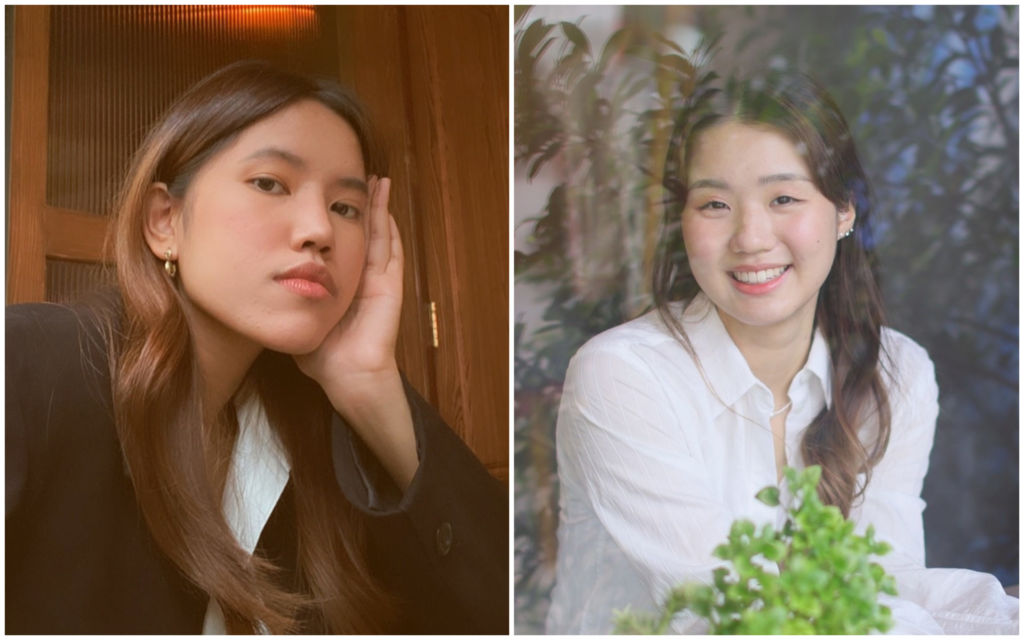
What made Cloud Cuckoo Country strike a chord with younger audiences immediately upon the activation of its social media accounts was actually the trailer’s use of the term “salim” – a term that’s thrust a sharp blade between friends and family divided by their vision for the nation’s future. For those who want Thailand to return to a free, open and pluralistic society, it has become a widely used term of debate. The trailer appeared to be the first time it’s been used in a Thai film.
Cloud Cuckoo Country was shot entirely on location at well-known tourist sites in Bangkok’s old quarter, the Phra Nakhon district, including Wat Pho, the National Museum, the iconic yellow-walled Ministry of Interior, and Sanam Luang with the Grand Palace looming behind.

That’s where the lines separating utopia from dystopia are blurred, Aim-ei said.
“You can even say that this film is a mirror that reflects Thailand’s past and present, and maybe predicts the future of Thailand,” Aim-ei said. “We’re showing you the most ‘perfect’ area in Bangkok, but if you look deeper, what are you seeing? What is this city being supported by, and which kind of beliefs? Is it a utopian city, or actually a dystopian one?”
Movies that tap into Thai politics, although very few in number, are not new. In recent years there were Ten Years Thailand (2018), a thought-provoking anthropology that imagined Thailand darkly in a decades’ time, and By The Time It Gets Dark (2016), which told an interwoven story of characters connected by the 1976 Thammasat massacre.
Just last year, Taiki Sakpisit’s debut film The Edge of Daybreak hit Thai cinemas with a mesmerizing narrative of a family haunted by the country’s vicious political cycle.
Aim-ei and Tamonman were in Japan last month for Cloud Cuckoo Country’s premiere at the Osaka Asian Film Festival. It’s still unknown whether the film will show in Thailand, however.
We talked with Aim-ei and Tamonwan about their debut movie. The interview is slightly edited below.
Why a lesbian couple as protagonists, something that’s rarely seen in Thai movies?
Aim-ei: It’s partly because lesbian couples are rarely portrayed in Thai media. It’s only recently that Thai society has become more accepting of lesbian couples. Before this, lesbians were stereotypically represented as a fantasy that fades in time – they will eventually marry a man or something like that. Unlike gay men, lesbians are relatively invisible in Thai mainstream media. We cannot think of any iconic lesbian couple in Thai media, can we?
So it’s my intention to have two protagonists as lesbians, which represent a couple that is not taken seriously by Thai society. So the audience can see that they have their own conversation, they talk about love life and settling down together, and they have their own pain. They can love, part ways, and reunite with former partners just like any couples in the gender spectrum.
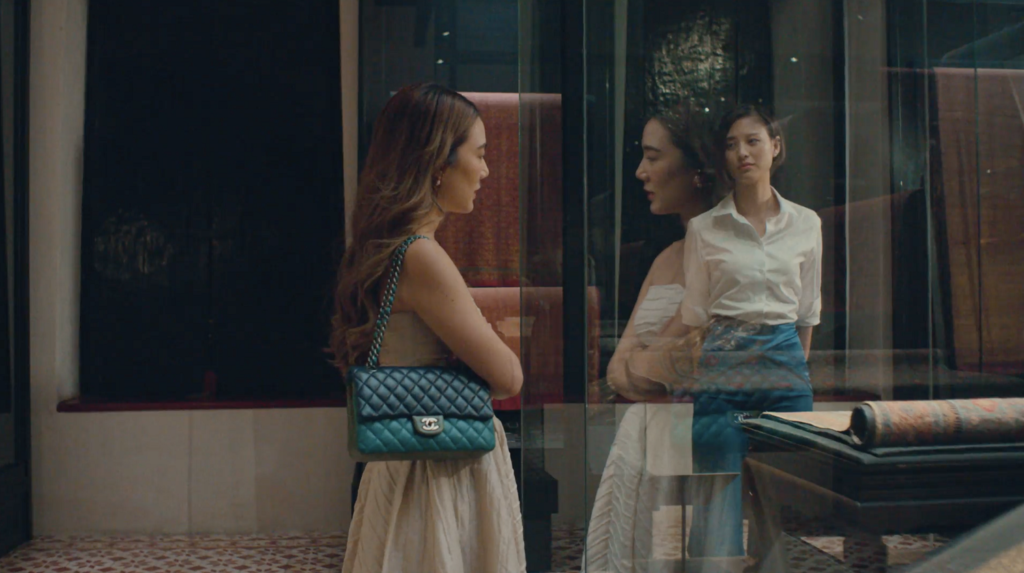
A part of your script was censored by the Culture Ministry, could you tell us more about it?
Aim-ei: There was a scene where the two characters walk into the National Museum and talk about Thai history. Authorities at the Culture Ministry told us that they reviewed our script and wanted to cut some parts out. They brought us into a meeting where about 10 officials were and told us that we should not portray Thai people as fighting against each other. I told them that this film will screen abroad, and they replied that it was even worse. “You cannot tell foreigners that Thai people are fighting each other,” they told us.

Tamonwan: That is exactly just like in the movie in which Nantachat’s character feels that we shouldn’t represent the negative side of the country to foreigners.
Aim-ei: The more they tried to censor us, the more we wanted to include this “sensitive” elements in the movie. In the end, we finished the movie with the help of some new-generation museum staff.
Why ‘Cloud Cuckoo Country?’
Aim-ei: Actually we came up with many names before this, but we settled with the term Cloud Cuckoo Land that’s mentioned in a Greek play by Aristophanes called The Birds. Plus, the phrase itself means an idealistic place that’s so perfect it may or may not exist in real life. What would be a more suitable term to describe many Thai people?
Actually, to me, the main protagonist of this movie is a character that holds conservative views like salims. I wonder what they are thinking, whether they’re questioning what’s going on with the country, and what do they feel like when they’re living in the cloud cuckoo land.

When you wrote the script, what was on your mind?
Aim-ei: I started writing the script when I was working as a speechwriter for a political party. I had a conversation with friends that Thailand has such a very unique history and political climate. We even have unique terms not used elsewhere like “salim,” “Redshirts,” and “Yellowshirts” that need extensive explanations. It’s very unique to Thailand, and I wanted to document this.
Take my family for example. My family has a wide range of political views, but we still sit down for meals together or meet up for the New Year’s holidays. Some days, we fight and argue with each other. I feel like our Thailand has gone through all kinds of conflicts and ideologies, and I just wonder, “How long are we going to live like this?” I feel like this movie could be a coming-of-age film for everyone in Thailand.
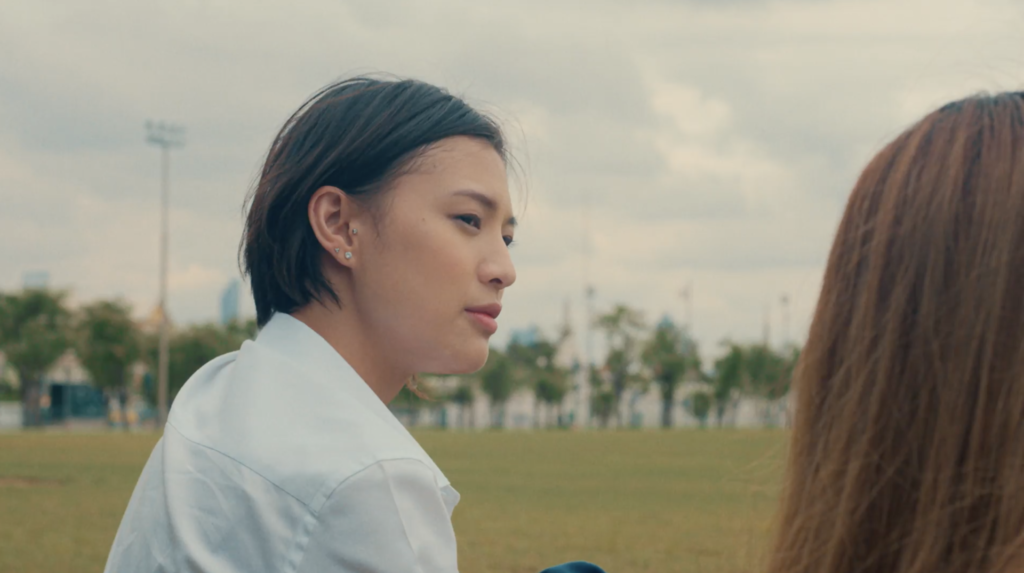
This film chooses to say ‘salim’ out loud. Why? And do you think that was a bold move?
Tamonwan: Because we don’t want to talk about it subtly through symbols (laughter).
Aim-ei: I’ve watched some Thai political movies and most of them chose to convey strong political messages through symbols that hide in plain sight. My friends and I had to analyze things in the movie like, “Does this scene try to talk about this and that?” which we’ll never know if it’s the director’s intention. I’ve seen so many films using symbols, but no one dares to talk out loud.
So I choose to say it because I want to, that’s it. If we don’t start to say it out loud, no one will. The term “salim” is commonly used in our everyday life, so why can’t we talk about it? If a pop culture vocab like this is not featured in a movie, how else can we record that the term once exists?
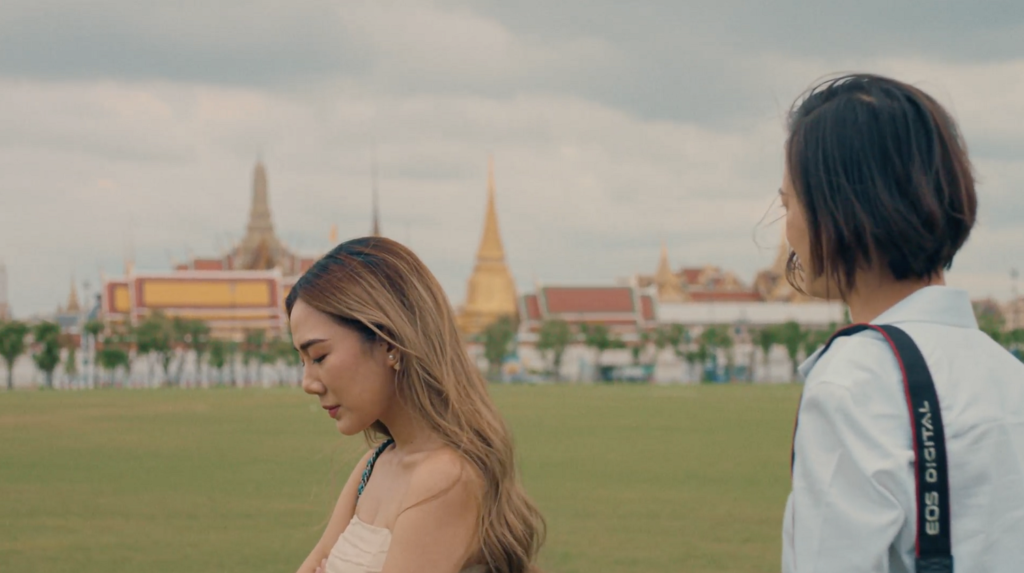
Throughout the film, you shot only at tourist attractions like the National Museum, Wat Pho, and Sanam Luang with the Grand Palace seen as a backdrop. Why?
Aim-ei: I felt that if I have to tell a story about Thai history and politics, I need to tell it from the roots where significant events happened. I also want to tell a story through characters who walk throughout the city, which cannot be done by a theater play that I’ve done before. My story must have places like Sanam Luang, the National Museum, and Wat Pho. When conservative nationalists talk about Thailand, they’d be like, “look at the Grand Palace, look at Wat Pho, they’re so beautiful.”
That’s why, to me, (the actors) Nantanat and Chayatanus are not the only characters of the film, but I also consider these venues the protagonists, too. I even discussed with Tamonwan that if I cannot shoot at these places, I wouldn’t make this movie at all.
Tamonwan: When Aim-ei and I were university students, we liked to go to the Phra Nakhon area. We went there so often. We’d walk around for a few hours, shop, and talk about history. We went to Wat Pho and thought it was so beautiful. We even joked that it would be nice to shoot a film there. We didn’t know that in the end we would be able to do it.
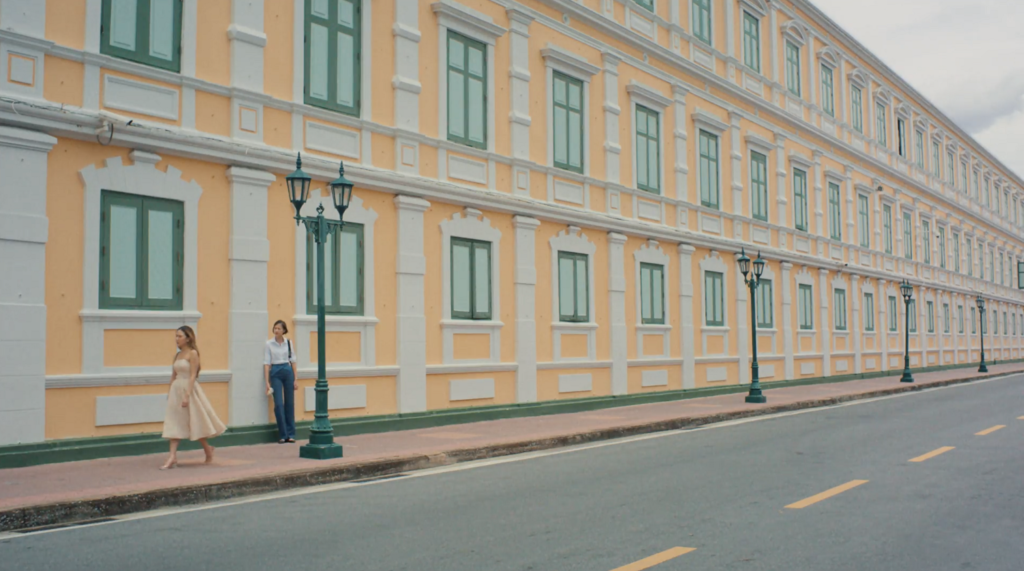
How do you characterize ‘salim’ in the film?
Aim-ei: During the workshop, the actresses and I discussed “salim” a lot. We think of questions like who a salim is, what’s good or bad about their personalities, and what their upbringings are like. We’re talking about a person who adheres to a certain ideology and we want to put ourselves into their shoes without any judgment. I want to explore their feelings more, and what would happen if they are confronted by someone who holds a different political view. How would they react, especially when they’re at their “comfort zone” like the Phra Nakhon area?
Tamonwan: We also believe that today there are many people today who are called “three hoofers” [a term used by the coalition of social conservatives, nationalists and royalists to insult pro-democracy protesters for their famous “three-finger salute”]. When they watch this, they may understand more from the point of view of Nantachat’s character. But this doesn’t mean that we’re trying to justify salims.
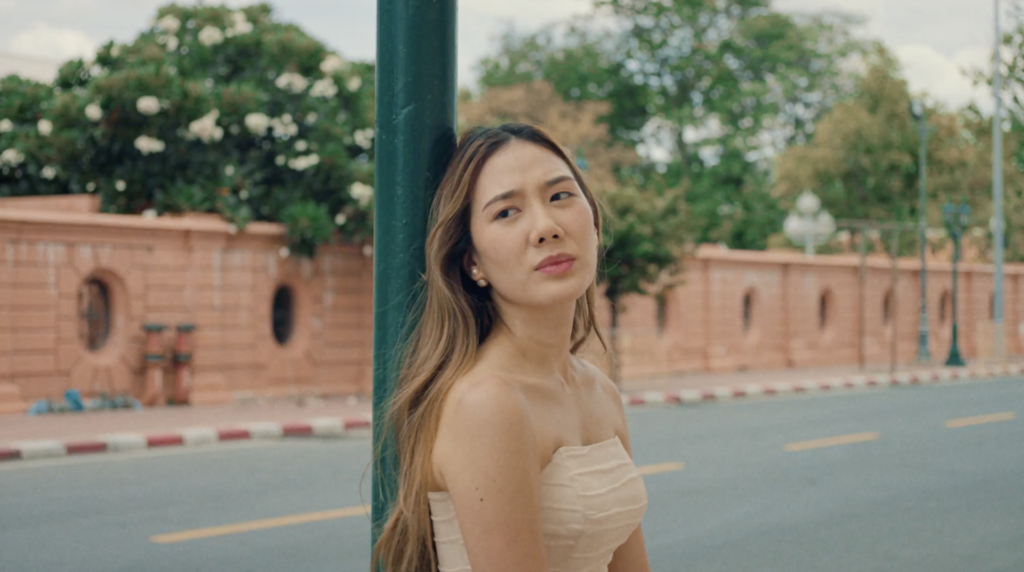
What do you think about film censorship in Thailand?
Aim-ei: For me, Cloud Cuckoo Land does not contain extreme content that needs to be censored. It’s just that Thai people are not familiar with movies that directly talk about Thai politics for a long time. Only when they saw our movie trailer, and they already assumed that we wouldn’t be able to screen in Thailand. Actually, many films before us decided to censor their works before sending them to the film censor board. That’s why we cannot break the traditional boundaries. And I feel that I don’t want to shut the door before I even try. So I decided not to censor myself and my work. If authorities want to censor us, we’ll think about that later.
Your film premiered in Osaka, Japan. Was the audience in Japan able to relate with it?
Aim-ei: We did not expect at all to be able to screen our film in Osaka, because usually Thai films from giant companies like GDH would screen there. At first I was a bit worried if the audience in Japan would understand my film. But later we got a chance to talk to a film critic of the festival, who told us that even though the film heavily revolves around the Thai context, what’s universal is political polarization. Japan does have that too and the audience there to some extent could relate with my film. The world today is divided more than ever. People anywhere know what it feels like to fight for their ideologies. Feeling the pain out of the fight is also universal.

Any expectations from the Thai audience if/when the film is screened in Thailand?
Aim-ei: Once I finish my work, it then belongs to the audience. It applies to this film, too. I know the film may be perceived as controversial to some people, but I insist that anyone can see it, regardless of which political side they’re on. I want to see if my film can raise questions or discussions among the audience. In fact, I want people whose political ideology differs from mine to see this film. They may like it or hate it, but it’s up to them in the end. After they see this, they may realize who is actually our true nemesis, because right now we just keep fighting each other and end up getting hurt.
You can even say that this film is a mirror that reflects Thailand’s past and present, and maybe predicts the future of Thailand. I feel like we’re talking about Thai people’s mutual realm of fantasy. In the film, we’re showing you the most perfect area of Bangkok, but if you look deeper, what are you seeing? What is this city being supported by, and which kind of beliefs? Is it utopian, or actually dystopian? That’s up to the audience’s interpretation.
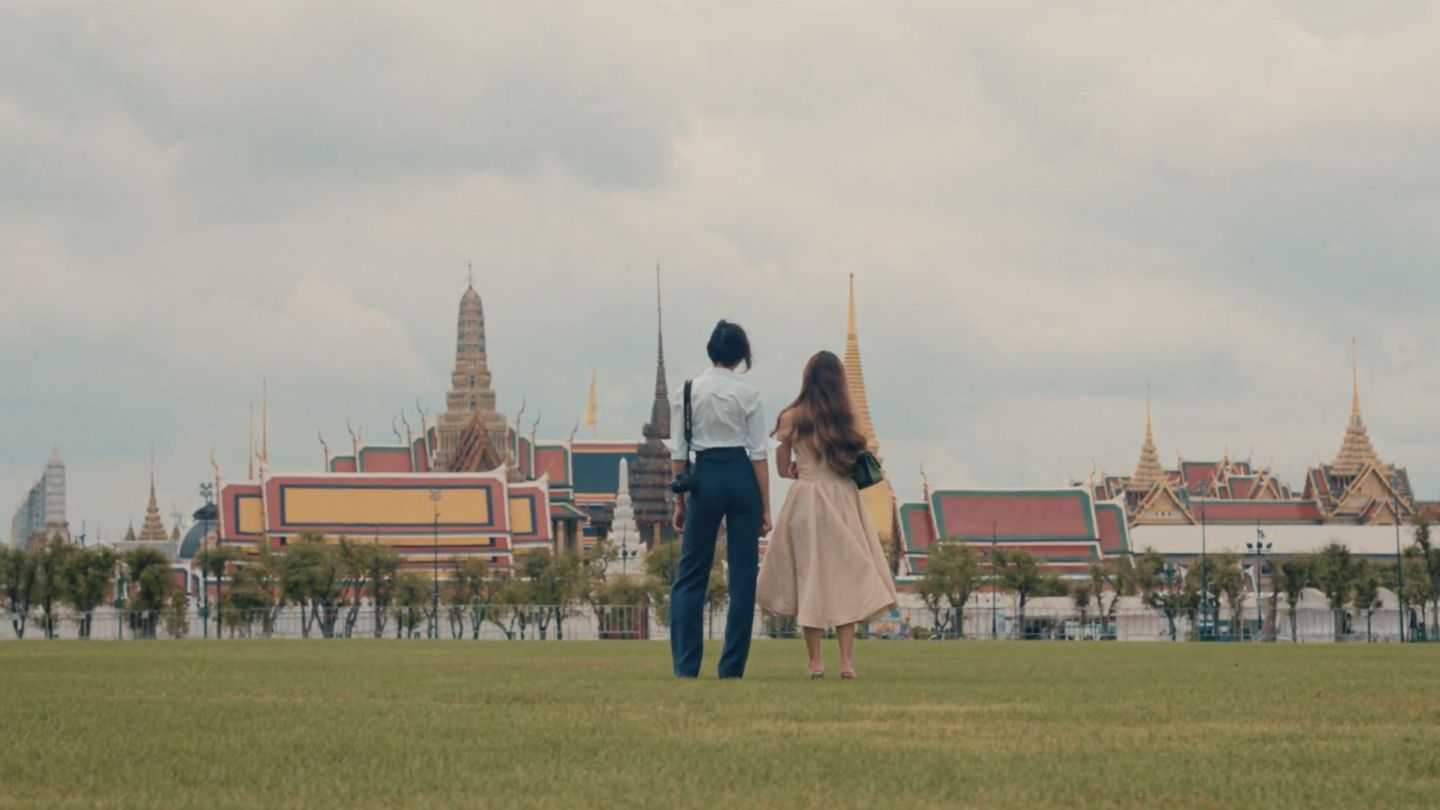




Reader Interactions